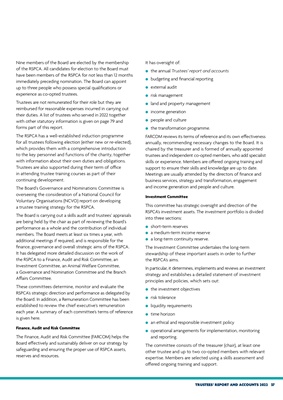
TRUSTEES' REPORT AND ACCOUNTS 2022 37
Nine members of the Board are elected by the membership
of the RSPCA. All candidates for election to the Board must
have been members of the RSPCA for not less than 12 months
immediately preceding nomination. The Board can appoint
up to three people who possess special qualifications or
experience as co-opted trustees.
Trustees are not remunerated for their role but they are
reimbursed for reasonable expenses incurred in carrying out
their duties. A list of trustees who served in 2022 together
with other statutory information is given on page 79 and
forms part of this report.
The RSPCA has a well-established induction programme
for all trustees following election (either new or re-elected),
which provides them with a comprehensive introduction
to the key personnel and functions of the charity, together
with information about their own duties and obligations.
Trustees are also supported during their term of office
in attending trustee training courses as part of their
continuing development.
The Board's Governance and Nominations Committee is
overseeing the consideration of a National Council for
Voluntary Organisations (NCVO) report on developing
a trustee training strategy for the RSPCA.
The Board is carrying out a skills audit and trustees' appraisals
are being held by the chair as part of reviewing the Board's
performance as a whole and the contribution of individual
members. The Board meets at least six times a year, with
additional meetings if required, and is responsible for the
finance, governance and overall strategic aims of the RSPCA.
It has delegated more detailed discussion on the work of
the RSPCA to a Finance, Audit and Risk Committee, an
Investment Committee, an Animal Welfare Committee,
a Governance and Nomination Committee and the Branch
Affairs Committee.
These committees determine, monitor and evaluate the
RSPCA's strategic direction and performance as delegated by
the Board. In addition, a Remuneration Committee has been
established to review the chief executive's remuneration
each year. A summary of each committee's terms of reference
is given here.
Finance, Audit and Risk Committee
The Finance, Audit and Risk Committee (FARCOM) helps the
Board effectively and sustainably deliver on our strategy by
safeguarding and ensuring the proper use of RSPCA assets,
reserves and resources.
It has oversight of:
l the annual Trustees' report and accounts
l budgeting and financial reporting
l external audit
l risk management
l land and property management
l income generation
l people and culture
l the transformation programme.
FARCOM reviews its terms of reference and its own effectiveness
annually, recommending necessary changes to the Board. It is
chaired by the treasurer and is formed of annually appointed
trustees and independent co-opted members, who add specialist
skills or experience. Members are offered ongoing training and
support to ensure their skills and knowledge are up to date.
Meetings are usually attended by the directors of finance and
business services, strategy and transformation, engagement
and income generation and people and culture.
Investment Committee
This committee has strategic oversight and direction of the
RSPCA's investment assets. The investment portfolio is divided
into three sections:
l short-term reserves
l a medium-term income reserve
l a long-term continuity reserve.
The Investment Committee undertakes the long-term
stewardship of these important assets in order to further
the RSPCA's aims.
In particular, it determines, implements and reviews an investment
strategy and establishes a detailed statement of investment
principles and policies, which sets out:
l the investment objectives
l risk tolerance
l liquidity requirements
l time horizon
l an ethical and responsible investment policy
l operational arrangements for implementation, monitoring
and reporting.
The committee consists of the treasurer (chair), at least one
other trustee and up to two co-opted members with relevant
expertise. Members are selected using a skills assessment and
offered ongoing training and support.